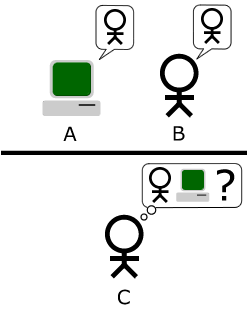created 2025-05-06, & modified, =this.modified
NOTE
Classic CS paper that introduced the Turing test. I’ve read it before, and it’s notably a poor paper, however in listening to a dissection (autopsy) in the Future of Coding podcast I realized I needed it again to refresh my opinion.
It reads like a proto-blog post and not something rigorous, which I am somewhat sympathetic towards.
Imitation Game
Turing asks to consider this question, “Can Machines Think?”
Rather than use popular use to define machine and think he’ll replace the question with a game, the Imitation Game.
Three people
- a man (
A) - a woman (
B) - an interrogator (
C, of either sex) play the game.Cstays in another room, and must determine which of the other two is a man or a woman.
They can ask questions like, “Will X tell me the length of his or her hair?” which can then be lied to in an attempt to mislead.
He suggests use of teletype or typewriter to hide the tones of voice.
They then swap the places, and a human interrogates the machine and another human. These questions replace “Can machines think?”

If the judge cannot consistently tell which is which, then the computer wins the game.
He’s asking not about thinking but asking whether a machine can act indistinguishably from a human being, talking about performance and how a casual system might generate these actions.
Objections
- religious – thinking is the function an immortal soul, so machines cannot think.
- heads in the sand – the consequences are too dreadful, and it’s better to remain ignorant, especially amongst the threatened intellectual elite.
- mathematical – using the incompleteness theorem, there are limits based on logic on what a computer can answer.
- consciousness – the computer does not write a sonnet because emotions are felt.
- disabilities – take form of computers cannot do x (be kind, resourceful, beautiful, friendly, make someone fall in love with it)
- lady lovelace objection – computers are incapable of originality quoting Ada “The Analytical Engine has no pretensions whatever to originate anything. It can do whatever we know how to order it to perform. It can follow analysis; but it has no power of anticipating any analytical relations or truths.”
- continuity of nervous system – the brain is not digital
- informality of behavior – systems governed by laws will be predictable therefore not truly intelligent.
- esp – mind-reading could be worked out of the test
Thought
He’s goofed on about commenting on ESP, which was en vogue and debunked (I love Bester’s Demolished Man), but I do wonder if we can reach a state where through computer assisted interpretation environment and subject we can read humans.
The leaking of semantic symbols are everywhere, like how on a basic level, studies conducted can determine words typed through acoustic analysis. Similarly, it seems to me precise analysis of language use can isolate the individual (or at least deduce who is who out of a smaller grouping).